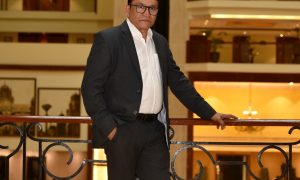This Interview has been published by Pragya Chandni and The SuperLawyer Team

Could you walk us through your journey from studying law to becoming a prominent figure in the legal field, including some key moments that shaped your career path?
I am a first-generation lawyer. I found interest during middle school in social sciences, current affairs, debating, quizzing and a flare for languages and writing. In high school, ‘Plan A’ was to pursue a five-year integrated law course and ‘Plan B’ was to pursue higher studies in international studies. I prepared and took the admission tests for different law schools, then there was no CLAT. Plan A worked for me, I chose Amity Law School, New Delhi which was then affiliated with Guru Gobind Singh Indraprastha University in Delhi to be close to home and work in a lawyer’s chamber while studying. I worked in a lawyer’s chamber since my first year of college to learn the dynamics of legal practice. The lessons learnt over these years have shaped me for what I am today:
Lesson 1: Always do your groundwork in any assignment thoroughly, it will help you in the long term.
I worked in lawyers’ chambers and law firms to understand the dynamics of legal practice while pursuing my degree to find my area of interest upon graduation. The rigour I went through during the law school internships helped me to get through a campus placement with the Organizing Committee, Commonwealth Games 2010 Delhi. I cracked the interview questions in my campus placement as I knew the laws of broadcasting rights under the copyright laws in India which I had researched for a matter during internships.
Lesson 2: The key to being a good lawyer is ‘ATD’ i.e., pay ‘Attention to Detail’ in the documents you draft and review.
Since my first assignment as a law student, I have developed a keen eye for whatever matter or document I draft and review. Every minute aspect of the matter or document makes a lasting impression on your work ethic. As lawyers, we are known for our choice of words and conduct. Documents we review and draft and the words we speak are reflections of our competence and capabilities.
Lesson 3: Every experience counts. Every role and experience brings learning which helps you to achieve your goals.
The various roles in India and the US across industries got me learning which helped me immensely as an in-house lawyer and working parent. Recently, while penning down words for an award nomination I realised that the varied roles I had undertaken ranging from a general counsel for a technology firm to a not-for-profit organisation have helped me understand and address a wide range of issues related to their operations, compliance, risk mitigation, fundraising and stakeholder management has groomed me into a resilient person with the ability to resolve legal concerns effectively for my stakeholders in the professional realm. I felt extremely privileged to be among the 5 nominees for the award among so many esteemed counsels of India.
Your work spans across various industries and geographies. How do you navigate the complexities of different legal systems and business landscapes?
The varied opportunities across jurisdictions have taught me to stick to the fundamentals and tackle complexities across different legal systems and business landscapes on a case-to-case basis:
- Analytical bent of mind – develop the ability to deal with complex matters to cut across legal areas. I use the ‘IRAC’ (Issue, Rule, Analysis, Conclusion) method learnt in law school to dissect an issue and step-wise resolution.
- Strong cross-cultural communication– the key to being an effective lawyer is communication through drafting, redlining, negotiating, and stakeholder management. Over the years I have learnt and am still learning the art of effective communication which has helped me learn culture across the globe and effectively communicate with my stakeholders across jurisdictions
- Business acumen – business knowledge is the key to success as a counsel. To be an effective in-house counsel it is essential to understand the business operations of the organisation/ your client and become a strategic partner to the business stakeholders;
- Execution– In the end what matters is effective execution and post-execution assessment. Effective and efficient execution comes with meticulous planning and a flexible mindset to make things work around situations with deviations from the original plan. Effective and efficient executors are always valued and appreciated. Post-execution assessment is important as it helps you understand the gaps and there is always room for improvement for the next time.
As someone who has held significant roles in both corporate and non-profit sectors, how do you approach the balance between legal compliance and broader social responsibility?
Legal compliance and broader social responsibility go hand in hand in both sectors and have the same approach. On a case-to-case basis, the requirement of legal compliance and the obligation an organisation has towards social welfare are weighed against each other on the following parameters:
- Risk Assessment: Is legal compliance mandatory or optional and what implications does it have for the organisation, if not adhered to?
- Impact Assessment: Does the broader social responsibility meet the objective of social welfare where the organisation can directly or consequentially give back to society for the resources utilised for its success?
Balance of these two aspects is important as it ensures organic growth of the organisation while the checks and balances are in place.
Your experience involves spearheading legal departments and teams. What are some effective strategies you’ve employed to foster collaboration and drive efficiency within your teams?
Legal team is a support services function in any organisation, it involves collaboration with internal and external stakeholders regularly. My aim is always to be an asset to my stakeholders by:
- Technical knowledge and understanding – Lawyers are subject matter experts so we are here to resolve legal issues, carry compliances, forecast and mitigate risks to ensure the smooth functioning of the organisation;
- Approachability – Make sure you are approachable to everyone in the organisation with visibility of our schedule. It builds trust and transparency with the stakeholders and helps legal become a valued strategic partner for the business;
- Empathy – Always place yourself in the shoes of the stakeholder coming to your desk expecting a solution. It goes a long way for a lawyer during our professional journey;
- Adhere to your commitments– Pay attention to detail, stick to the timelines committed and work towards an efficient turn-around-time with accuracy;
- Assumptions – Never assume, it never works and is a perfect recipe for disaster and miscommunication. Speak up, repeat, clarify and ask for help when required;
- Communication– Effective communication with your stakeholders or during a negotiation shows transparency and instil confidence in the other person on the table.
Given your involvement in various mergers, acquisitions, and strategic collaborations, could you share some insights into navigating complex legal negotiations and ensuring favourable outcomes for your organizations?
Complexities are natural in any transaction and deal where I always aim to achieve the best outcome in such situations for my client/ organisation by:
- Identifying the issues and dealing with the complexities, layer by layer by separating the multiple issues;
- Doing in-depth research of facts and law– I follow the principle of redundancy while undertaking research on any matter to be well-prepared for the unusual, worst-case scenario;
- Evaluating the risks by aligning the risk matrix with the management of the organisation and focusing on the concerns on a priority basis;
- Bring the cost-effective solution to the table– I always have multiple solutions and plans for back up which is cost-effective and beneficial for the organisation;
- Being an executor – I always ensure a seamless execution and closure of the matter. Subsequently, I always ensure processes are laid down taking care of the concerns for future risk mitigation.
Recently, there was success in settling a privacy troll matter without shelling out a single cent to the complainant by tapping into complete in-house resources while following the above steps.
With your extensive experience in policy formulation and implementation, how do you ensure that legal frameworks keep pace with rapidly evolving technologies and business practices?
As an in-house counsel for a technology start-up, my primary focus is to understand the evolving technology changing the nature of the products and services, along with the changing regulatory landscape across the globe.
The 3 main things which help my strategies in the rapidly changing scenarios are:
- Regular interactions with the product, engineering and revenue teams to gain visibility of the changes made or to be made on the products and services platform. Accordingly, assess and align the forecasted changes with the law, regulations and policy formulation well in advance;
- Revisit policies and compliances related to business operations, employment and data regularly. Ensure all policies and compliances are always up-to-date, address business requirements and smooth functioning of the business with an efficient turn-around-time;
- Maintain a detailed repository of all documents related to day-to-day operations, compliances, policies, disputes and other matters, it helps to understand the previous and present framework and its loopholes and make changes effectively and efficiently for the expected transactions.
While following the above three points, always remember to optimise cost-effective and efficient resources.
You’ve received recognition for your contributions to the legal field, including awards such as General Counsel of the Year. What do you believe sets exceptional legal professionals apart in today’s competitive landscape?
- Work on your concepts – No matter how high you go up on the ranks, stay in touch with your fundamentals, go back to conventional textbooks and revise your concepts;
- Always be a work in progress – Be open to suggestions and learnings. Stay a lifelong student;
- Knowledge sharing – Apply and share your learnings with others. The more you share the more you learn;
- Make mistakes and learn from failures – Always look for challenges, do not shy away from them, make mistakes and learn from them and be better prepared for the next time;
- Empathise – Always place yourself in others’ shoes which will help you understand the situation and arrive at optimal solutions;
- Believe in yourself, then you can make others believe in you.
Your work with the Southwest Michigan Human Trafficking Task Force highlights a commitment to social justice. How do you integrate your legal expertise into advocacy efforts for vulnerable populations?
I was fortunate to spend time with underprivileged children during school holidays as a teenager helping my mother run a not-for-profit school in the slums of Delhi. I understand that policies are easily drafted for the welfare and upliftment of the marginalised section of the society, however, there is a huge gap in implementation and execution of these policies. Learnings from my early days helped me understand the concepts while studying law in India and the US on identification, tackling, resolution, implementation and post-implementation follow-ups.
In the US, I again got the opportunity to work in the social welfare sector with the Southwest Michigan Human Trafficking Task Force, the underlying issues were the same i.e., to bridge the gap between policies and their implementation at the ground level. This is where I translate my legal knowledge into words understandable for stakeholders in society to facilitate a better understanding and implementation of the process at the ground level which benefits the human-trafficked survivors and their relocation to mainstream society with a normal means of livelihood. Moreover, efficient implementation involves significant monetary consideration where I also leveraged my knowledge of law and policies with the implementation plan to pitch project plans and raise funds to support the cause. Advocacy for social justice requires a holistic understanding of various factors such as social, political, economic and demographic along with laws and policies of that geography. It requires a lot of patience and empathy to stand for your conviction and belief in the cause as it is a long process for your hard work to yield fruits.
Finally, as someone who has achieved significant success in the legal profession, what advice would you offer to fresh graduates aspiring to embark on a similar path?
I am a student, learning from everyone and anything I come across in this journey called ‘Life’. I consider success relative and temporary based on the circumstances, it is significant but short-term. I always keep the focus on the journey and experience.
In the last decade, opportunities have multiplied in the legal job sector especially as in-house counsels. The key to becoming a good lawyer is to stick to your fundamentals and keep patience. These days, I come across law graduates post-graduation who consider corporate or corporate law firm roles non-exciting and want to disrupt the legal field with their brilliant ideas. I feel so good to come across such young brilliant minds, but many need to gain knowledge of operations and administration which seems dull and mundane. The boring, non-challenging work in the corporate, law firm, and lawyer’s chamber helps one understand the importance of processes and policies crucial for business operations and administration. Yes, learning from one’s mistakes is a must but it is equally important to leverage the things already in place through the opportunities. There is no need to reinvent the wheel as resources are limited and valuable, consider yourself fortunate to have access to whatever opportunities you come across. You never know what opportunity comes your way.
Get in touch with Debopama Roy-























